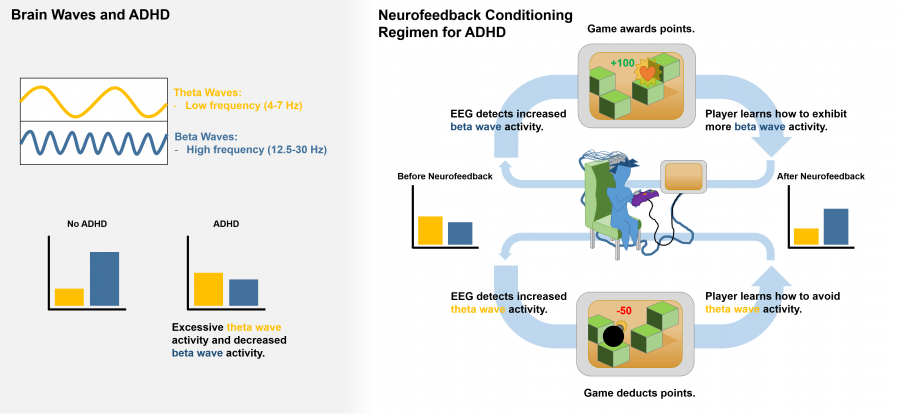Many different psychiatric disorders are characterized by specific patterns of brain activity, leading researchers and clinicians to investigate whether EEG and fMRI-based neurofeedback training can be used to treat such disorders by altering pathological aspects of brain function. To examine how this might work, let’s return to how neurofeedback training might be used to help children with ADHD increase their focus.
Children diagnosed with ADHD tend to have an excess of low frequency (theta) brain waves and fewer high frequency (beta) waves in certain regions of the cortex, as detected by EEG (Figure 1). Therefore, neurofeedback training for children with ADHD attempts to minimize the occurrence of lower frequency theta waves and enhance the occurrence of higher frequency beta waves. This is done by rewarding the children each time they demonstrate beta waves during neurofeedback training. Through the process of operant conditioning, the children intuitively learn to promote beta waves and suppress theta waves (Figure 1).

Figure 1. Neurofeedback as a treatment for attention-deficit hyperactivity disorder (ADHD). Children diagnosed with ADHD, who struggle to focus their attention, tend to display lower levels of high frequency beta waves and higher levels of low frequency theta waves, while children without this diagnosis show the opposite pattern (left). This observation suggests that beta waves are associated with an enhanced ability to focus. Neurofeedback training therefore seeks to elevate the magnitude of beta waves and suppress the magnitude of theta waves using operant conditioning paradigms (right). During training, the patient receives feedback about their own brain activity, sometimes in the form of a videogame.
Neurofeedback continues to produce positive results for ADHD as well as other psychiatric disorders including: Anxiety, Depression, and PTSD. Additionally, other issues such as: lack of motivation, sensory processing disorders, and anger issues have been shown to have a large reduction after neurofeedback.
For more articles like this please sign up for our eTips by liking us on Facebook and giving us your email for our Newsletter.





